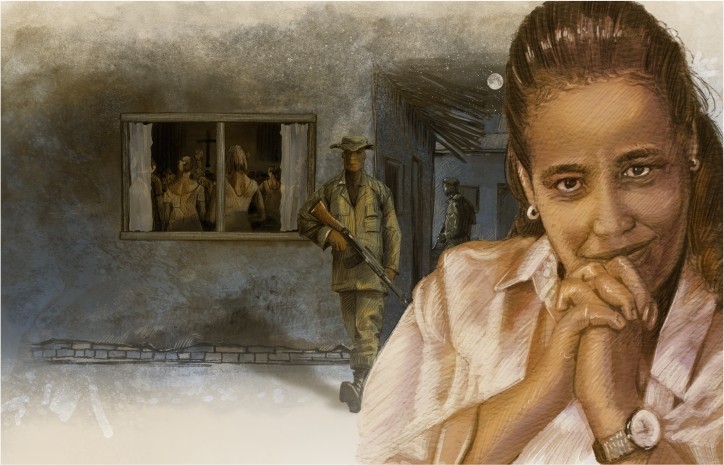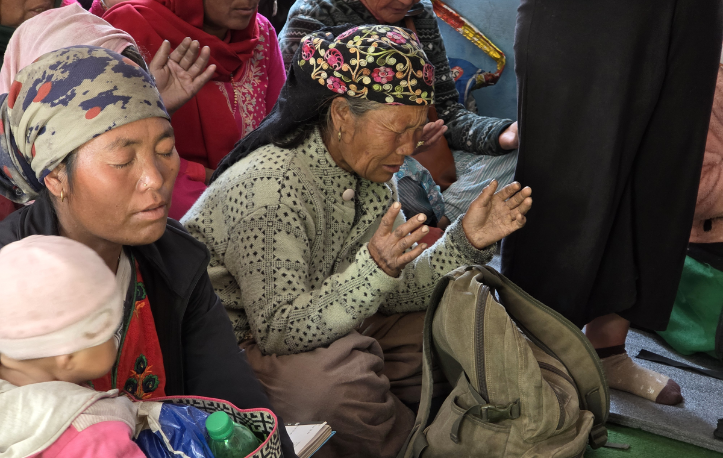Twen Theodros had been a Christian for only two years when she was arrested in Eritrea, the first time. In 2002, the country’s dictatorship outlawed every religious group except Sunni Islam, the Eritrean Orthodox Tewahedo Church, the Catholic Church and the Evangelical Lutheran Church of Eritrea. The government maintains tight control over these groups and their messages, and unapproved churches must meet secretly.
In February 2004, Twen, then 20, had just finished her mandatory military training and been assigned to work in Asmara, Eritrea’s capital. Around that time, she visited a house church to worship with other Christians in secret. Eritrean authorities, however, who actively infiltrate secret churches, discovered the worship meeting at the house church and arrested the believers one day as they left the gathering.
After spending the next month in prison, Twen was tricked into signing a document upon her release. Her father begged her to sign the document; he and the prison official both assured her that she was merely acknowledging that she could not preach in or attend a large church but could still preach to small groups. But when Twen returned to her military post and gave her supervisor a letter from the prison, she learned that she had unwittingly agreed to return to the government-approved religious group to which she formerly belonged. “I went home and started to cry and ask for forgiveness … repent,” she said. As she prayed, Revelation 3:16 came to mind: “So then, because you are lukewarm, and neither cold nor hot, I will vomit you out of My mouth.”
The verse helped Twen realise she had to fully commit herself to Christ or stop calling herself a Christian. She could either obey God’s Word or the letter she had signed. Kneeling beside her bed, she placed a Bible in front of her and imagined the letter she had signed resting beside it. “I asked my soul to choose one,” she said.
After committing to live according to God’s Word, Twen said she felt at peace. “I felt joy in my heart,” she said. Her commitment proved crucial in helping her endure the next 16 years of her life.
Second Arrest
Eight months after her first arrest, while Twen and about 60 other Christians were observing a New Year’s Eve prayer vigil, police surrounded their house and detained everyone inside. Twen said she recalled Philippians 1:29, “For to you it has been granted on behalf of Christ, not only to believe in Him, but also to suffer for His sake.”
Twen and the other Christians were taken to Mai Serwa prison, near Asmara, where they were locked in steel shipping containers. Conditions in these ‘prisons’, which are still used in Eritrea today, are some of the harshest in the world. During the day, Twen said, the heat became unbearable, and at night everyone struggled to stay warm. Prisoners received only lentil soup, bread and tea, along with a limited amount of water to drink.
While in prison, Twen became close friends with Helen Berhane, an Eritrean gospel singer who had been held in a shipping container since February 2004. Helen helped Twen cope with her new circumstances. But when Helen was released in October 2006 following a severe illness, guards isolated Twen to prevent her from witnessing to other inmates. “I was on my own,” Twen said. “It was really hard for me.”
During the day, the guards shut the small window on Twen’s shipping container, preventing fresh air from flowing inside. The goal was to break Twen’s resolve and force her to sign another document stating that she had renounced her faith.
At around noon one day, Twen began suffering shortness of breath from the stifling heat that had built up in the container. “I struggled to survive,” she said. “It was beyond my ability; it was too much for me. I started to pray, ‘God, please help me’.”
Her prayer was answered in the form of another recalled passage of Scripture, 1 Peter 4:12–13. God’s Word spoke directly to her situation: “Beloved, do not think it strange concerning the fiery trial which is to try you, as though some strange thing happened to you; but rejoice to the extent that you partake of Christ’s sufferings, that when His glory is revealed, you may also be glad with exceeding joy.”
Twen realised that her fiery trial was simply part of following Christ, and she accepted the possibility that it could lead to her death. “In one way,” she said, “I was happy because I would go to glory.
In the other way, the suffering was painful. While I was thinking about this, that verse gave me comfort and I started to feel like cool fresh air. I could see the presence of the Holy Spirit, and I started to praise God.”
Suddenly, after two years and ten months locked in the shipping container, mostly in isolation, Twen was transferred to another prison. “I felt great joy because when they took me to the other place I joined with other Christian sisters,” she said. “I felt as if I was getting released, so I praised God.”
Joining in Christ’s Sufferings
In Wi’a Prison, located on the Red Sea coast, where temperatures can climb above 38 degrees, Twen and other Christians were thrown into an underground cell — a hand-dug pit with walls made of stone. The guards tried to persuade the Christians there to renounce their faith. “They tried to scare us with warnings that unless we renounce our faith, we would suffer this or that,” Twen said, “but our position was to be faithful even to death.”
In time, the guards grew impatient and changed tactics. They began beating and whipping the women, providing only bread and one cup of water a day. But Twen and her cellmates remained firm in their faith, and Twen never wavered from the commitment she had made to God in 2004.
The guards’ torturous methods continued to evolve until, eventually, they forced the women to walk across the thorny ground under the scorching desert sun. “Then they made us lie on the ground, and they started to beat us hard,” Twen said. “They were beating one area on the shoulders, and they beat the same place again and again to cause maximum pain.”
At the end of the beating, the guards ordered the women to renounce their faith in Jesus Christ. One of the guards told Twen he would give her a few minutes to think about her answer, and then walked away. When he returned, Twen’s resolute faith made him even angrier. She had already made up her mind before being sent to prison that Christ is her life.
“Christ gave me His life,” she told the guard, “so to give Him my life is a small thing. As Scripture says, ‘Be faithful until death, and I will give you the crown of life’ [Revelation 2:10]. I already gave my life to Him.”
“We respected you,” the guard replied, “but you don’t deserve respect. Lie down! Lie down!”
He then beat Twen on the back repeatedly with as much force as he could muster. “It was too much,” Twen said. “I started to cry, ‘Please, Lord, don’t test me beyond what I can endure’.”
Twen began to think about Christ’s suffering for her on the cross, and she felt humbled to join him in that suffering. As she sensed God’s grace washing over her, she said she started to feel compassion towards the guard, even as he beat her. “Please forgive them, for they do not know what they are doing,” she prayed, recalling the words of Christ on the cross.
Soon, a new guard took over, relieving the others of their duties. This man, also a soldier, had a big stick with him. “He was just told to look after us, not to torture us,” Twen said.
But the new guard continued to beat the other girls at random with the stick.
As Twen prayed, she saw a vision of a man holding a child. The man, she said, looked like Jesus, and He was holding a young girl in His arms to protect her from sticks falling all around her. All the while, the child sat peacefully in His arms, touching His hair and smiling.
The next night, Twen was taken to be tortured. “I felt like all the sticks were falling on me,” she explained, “but I realised they were falling on Jesus as seen in my vision. It was Him who was taking the beating and who was suffering. Seeing that is how I got strength in my heart.”
Instead of asking God to release her or to sustain her health, Twen prayed that He would help her remain faithful. She said she was reminded of 1 Corinthians 6:19–20, which tells us we are purchased by the blood of Jesus Christ and are not our own.
“In the Scriptures, He never promises us that we won’t suffer,” Twen said. “I don’t belong to myself; I belong to God. He can take me wherever He wants me. I am just there to fulfil His will, not my own will.”
A few weeks later, the beatings resumed, but the guards didn’t restrict them to just one part of her body. As the intense pain caused her to drift in and out of consciousness, she experienced another vision. “I could see the stars getting bigger and bigger,” she said, “and I started to hear very pleasant music — an angel’s song — and felt fresh air.” Then she opened her eyes.
“I could see the man torturing me,” she said. “I could see his anger. He was studying me. I was very sad to be brought back from that taste of heaven. I asked God, ‘Why?’ I always remember that time.” Twen said the guards had hoped to use her disorientation to get her to renounce her faith.
That same night, Twen learned that the guards weren’t the only source of fear and suffering she might face. She and a friend were lying in the dark underground pit when Twen, in a semiconscious state, suddenly felt something sting her foot. Her friend lit a match, providing enough light for them to see a snake coiled by Twen’s foot. The friend then killed the snake with a nearby broom. About 10 minutes later, after again losing consciousness, the women were awakened by a noise: this time, a cobra and two other snakes were dragging the body of the dead snake across the floor. Twen’s friend killed two of the snakes, but the cobra slithered towards an opening in the stone wall, hissing.
When a guard who had heard the commotion opened the door and shone his torch on the cobra, Twen and the women asked him for help. But the guard, shaking with fear, instead left them his torch and baton before leaving the underground cell and locking the door behind him. Twen’s friend began to recite 1 Samuel 17:46, where David tells Goliath, “This day the Lord will deliver you into my hand, and I will strike you and take your head from you.”
“When we started to say these words again and again, we started to get strength,” Twen said. “We said [to the cobra], ‘Today, you are coming with your anger and are hissing, but we come against you in the name of the Lord, and God is going to hand your head to us’.”
The same friend who had killed the other snakes struck the cobra on the head. As it retreated into a tight coil, Twen pinned it against the wall with a stick while her friend beat it to death with another stick.
Soon after that incident, the beatings and torture stopped.
A Break from the Pain
After spending nearly six years in prison, Twen was allowed to leave temporarily to see a doctor for an eye condition. When the treatment required a second appointment, a friend persuaded prison officials to let Twen remain out of prison until the appointment.
While Twen was out of prison, her parents tried to get her to sign a document renouncing her faith. One day, they brought a church leader with them to help persuade Twen. Using the story in Genesis 20 in which Abraham misleads Abimelech about his wife, Sarah, to avoid being killed, the church leader told Twen that she needed to be wise like Abraham.
The church leader’s interpretation of the verse angered Twen. “It’s not good to twist the Word of God!” she told him. Surprised by her anger, the church leader apologised and abruptly ended the conversation.
One month later, after her second medical appointment, Twen decided to return to prison. She knew that if she failed to return, others would be persecuted by the authorities. “How can I take the risk of seeing others suffer because of me?” she thought.
After a tearful parting with family members, Twen returned to prison, where she remained for 10 more years. During that time, she clung to her hope in Christ. “I didn’t know when I was going to be released,” she said. “I was waiting for God’s timing; I was praying to remain faithful until that day happens.”
Shouting for Joy
On the morning of 8 September 2020, Twen woke up early because it was her turn to cook breakfast for the other prisoners. After breakfast, one of the chiefs called Twen’s name, and she soon learned that she was being released after spending 16 years in prison.
“Everybody was shouting for joy,” she said.
Following her release, Twen moved in with her mother and began the process of emotional and physical healing. A year and a half later, she developed pneumonia, her time in prison being a likely contributor to a weakened immune system.
Twen soon realised how much she had missed while in prison. She had lost precious time with her father, who had died two years before her release. But despite all of her sacrifices, she said her future with Christ more than makes up for it.
“I always try to compare eternity with this short period of our life on Earth,” she said. “We are really here for only 70 or 80 years in this world. I believe Christ is bigger than anything. He is good to me and everything I need, but God does things in His own time. The thing for me is to live for Christ.”
Twen initially found life outside prison difficult, seeing anew how people are consumed with working, studying and earning money. She prays for wisdom to have a balanced life.
While she admits that remaining faithful to Christ was at times difficult in prison, Twen said she could at least clearly see the enemy at work. “When you are out, you don’t see the work of the enemy so clearly,” she explained. “There are a lot of things that distract. We need more grace because we have a lot of something that looks good, but it distracts us from the work of God. We need to be vigilant.”
Today, more than 200 Christians are known to be in Eritrean prisons, including several top church leaders. Some of those in prison were arrested in 2004, the same year as Twen’s second arrest, and many of their families are unsure if their loved ones are still alive.
Reflecting on her own years of imprisonment, Twen said she is grateful for everything she gained through suffering. “Even if it is a difficult time of my life, I think like Peter and John, as they were counted worthy to suffer disgrace for the name of Jesus. I feel joy when I remember my time in prison,” she said, referencing Acts 5:41.
She also understands the importance of counting the cost of a commitment to Christ, such as the one she made in 2004 after her first arrest. “That decision took me through the 16 years of suffering,” she said.
Because of the likelihood of rearrest, she ultimately chose to leave Eritrea and settle in a new country. Twen said she prays that she will always live out her faith with the same passion and boldness she had during her imprisonment.
“Continue to pray for Eritrea and the persecuted in Eritrea,” she said, “that my brothers and sisters would be encouraged in their faith and be faithful to see beyond the situation, to see Jesus in His glory.”




Submit a Prayer